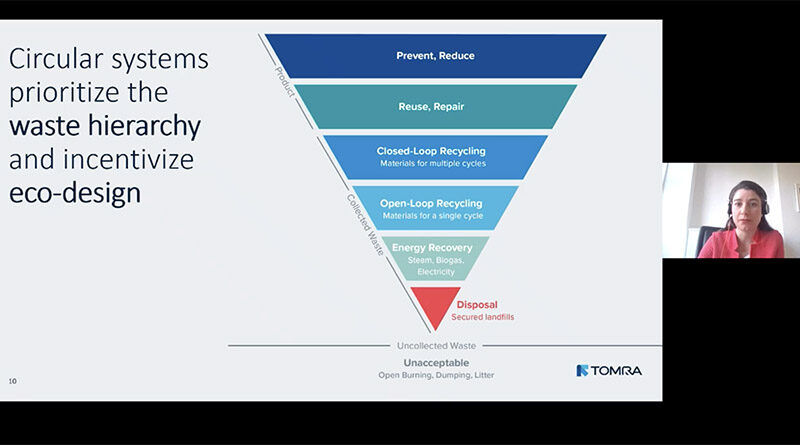Tomra identifies mandatory Extended Producer Responsibility as solution to packaging waste
Tomra has just published its latest white paper examining how to achieve greater performance from Extended Producer Responsibility (EPR) programs.
This policy principle shall give the power to accelerate society’s shift towards a more circular economy, where resources are reused repeatedly to maximize their value.
In a webcast that took place on March 28, 2022, the company explained details, features and principles of EPR and its recently published white paper. Speakers of the session where Sarah Bloomquist, Director Public Affairs at Tomra USA and Bilyana Ignatova, VP Circular Economy EU, Public Affairs at Tomra.
The webcast was moderated by Mithu Mohren, Senior VP Marketing & Communications Circular Economy at Tomra.
The company’s white paper, “EPR Unpacked – A Policy Framework for a Circular Economy”, examines EPR schemes for packaging waste and serves as a detailed guide for policymakers who design or develop EPR schemes, offering a multi-faceted perspective and practical insights to help achieve greater performance.
EPR ensures that producers and manufacturers take responsibility for the full lifecycle of their packaging – from design to waste collection and recycling, and final disposal. As producers must provide dedicated funding for their own packaging, this policy principle shall also incentivise sustainable packaging design and management based on the waste hierarchy, to achieve greater environmental outcomes.
The white paper explains the five design principles required for the successful implementation of an EPR scheme. According to Tomra, these are: circularity, which prioritises the waste hierarchy, incentivises eco-design, and utilises reliable measurement protocols; performance, which includes a well-defined scope, clear roles and responsibilities, and comprehensive targets that scale up over time; convenience and user-friendly systems that increase the amount of valuable resources that are collected and processed effectively; producer responsibility, which establishes clear rules for the management of packaging waste; and finally, system integrity, which ensures transparency and compliance to support the achievement of targets. Holistic analysis and organisation of the entire lifecycle of packaging are integral to an active environmental policy, while corresponding eco designs determine recyclate quality, independent of local conditions. The white paper shall provide advice on re-structuring or fine-tuning the existing system, transforming it into a closed loop.
“Our first-hand experience in numerous markets on all continents has taught us which methods can be used to successfully address the challenge of managing post-consumer packaging waste, and which combinations work best,” says Wolfgang Ringel, Senior VP Public Affairs Tomra. “In some regions, where effective waste management systems have been established, more needs to be done to encourage the proper collection, sorting, and recycling of valuable material that is simply thrown away. Implementing legally defined (in other words, mandatory) obligations covering the use of resources, and their responsible handling, is the way forward, as this will result in direct, active climate protection.”
Today, EPR is applied across regions globally. In Asia, local EPR initiatives have developed into cross-industry networks – a response to the fact that 80% of the plastic in the world’s oceans entered them via Asian waterways. South Africa and Vietnam have recently implemented EPR for packaging, and several states within the United States are currently considering such measures. While these efforts are making great strides in establishing effective systems, national and global harmonisation remains a challenge but offers great opportunity for circularity. Additionally, attractive pro-EPR framework regulations should promote investment and ensure the realisation of sustainable development.
In Europe, the robust targets defined in the 2019 Single-Use Plastics Directive have resulted in almost all EU member states introducing legislation on deposit return systems for beverage containers, which will apply by 2029. The implementation of EPR legislation is a transformative measure to improve both the quality and quantity of the resources that get recycled, thereby supporting the acceleration to a circular economy.
Visit Tomra
Download Tomra’s white paper “EPR Unpacked – A Policy Framework for a Circular Economy”

